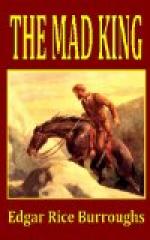It was the following morning that Victoria and Barney Custer, with Lieutenant Butzow and Custer’s partner, stood contemplating the smoldering wreckage.
“And to think,” said Barney, “that yesterday this muss was the largest corn mill west of anywhere. I guess we can both take vacations now, Bert.”
“Who would have thought that a single bolt of lightning could have resulted in such havoc?” mused Victoria.
“Who would?” agreed Lieutenant Butzow, and then, with a sudden narrowing of his eyes and a quick glance at Barney, “if it was lightning.”
The American looked at the Luthanian. “You think—” he started.
“I don’t dare think,” replied Butzow, “because of the fear of what this may mean to you and Miss Victoria if it was not lightning that destroyed the mill. I shouldn’t have spoken of it but that it may urge you to greater caution, which I cannot but think is most necessary since the warning I received from Lutha.”
“Why should Leopold seek to harm me now?” asked Barney. “It has been almost two years since you and I placed him upon his throne, only to be rewarded with threats and hatred. In that time neither of us has returned to Lutha nor in any way conspired against the king. I cannot fathom his motives.”
“There is the Princess Emma von der Tann,” Butzow reminded him. “She still repulses him. He may think that, with you removed definitely and permanently, all will then be plain sailing for him in that direction. Evidently he does not know the princess.”
An hour later they were all bidding Butzow good-bye at the station. Victoria Custer was genuinely grieved to see him go, for she liked this soldierly young officer of the Royal Horse Guards immensely.
“You must come back to America soon,” she urged.
He looked down at her from the steps of the moving train. There was something in his expression that she had never seen there before.
“I want to come back soon,” he answered, “to—to Beatrice,” and he flushed and smiled at his own stumbling tongue.
For about a week Barney Custer moped disconsolately, principally about the ruins of the corn mill. He was in everyone’s way and accomplished nothing.
“I was never intended for a captain of industry,” he confided to his partner for the hundredth time. “I wish some excuse would pop up to which I might hang a reason for beating it to Europe. There’s something doing there. Nearly everybody has declared war upon everybody else, and here I am stagnating in peace. I’d even welcome a tornado.”
His excuse was to come sooner than he imagined. That night, after the other members of his family had retired, Barney sat smoking within a screened porch off the living-room. His thoughts were upon a trim little figure in riding togs, as he had first seen it nearly two years before, clinging desperately to a runaway horse upon the narrow mountain road above Tafelberg.




